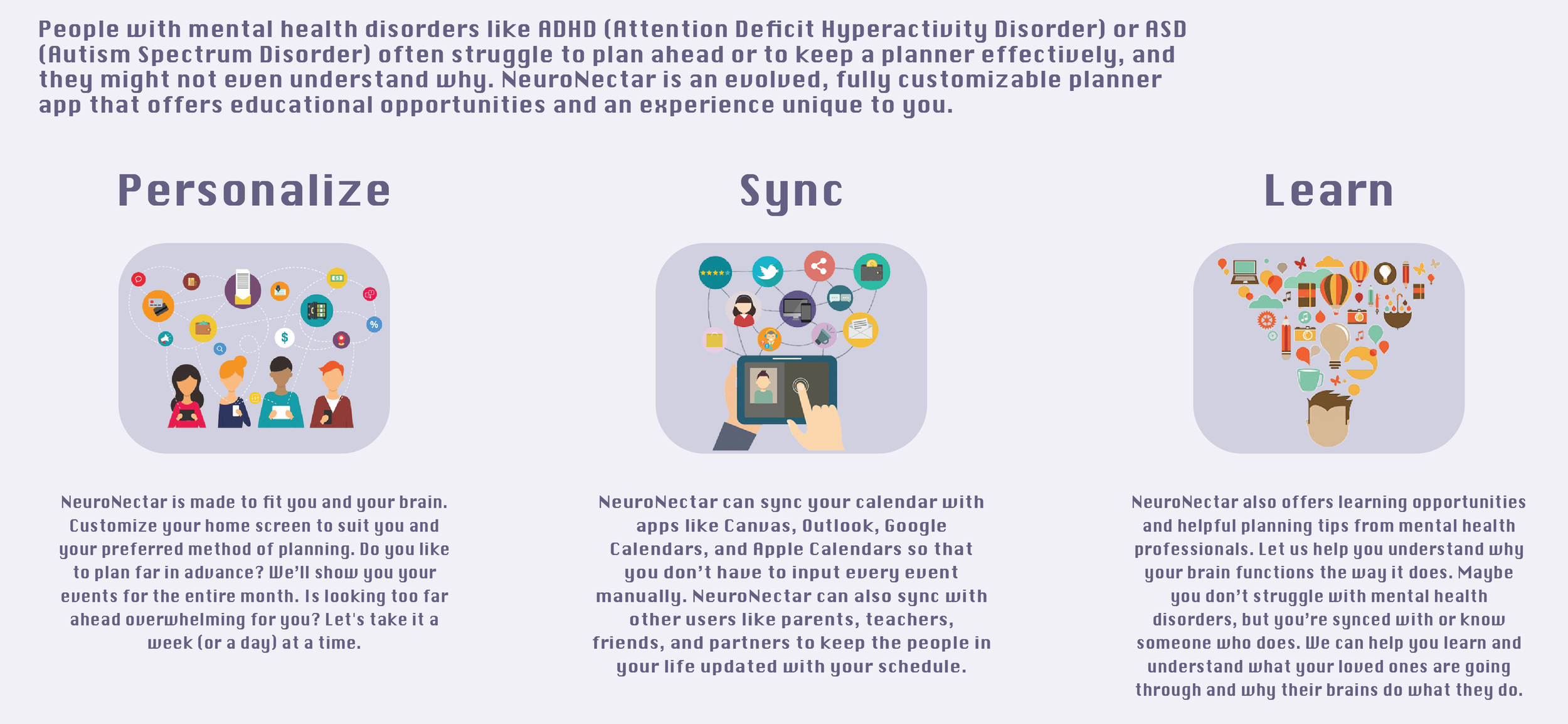ENVD 5030
For my ENVD 5030: ‘Entrepreneurship Studies’ course, I developed NeuroNectar, a concept for an innovative app that merges customizable calendar functionality with accessible mental health education. This project focused on designing a viable entrepreneurial venture, meaning the emphasis was on research, branding, and market feasibility rather than full-scale prototyping. The result was a compelling business concept that highlights an unmet need in the app market: a planner designed specifically for individuals with mental health disorders, integrated with a structured educational component.
While a full prototype was beyond the project’s scope, I created an initial Figma flow to illustrate user onboarding, including a guided questionnaire for personalized recommendations/ customizations. Additionally, I designed two interface mockups showcasing the home screen and educational section, prioritizing a clean and accessible layout.
Further, I analyzed the broader social impact, using statistical infographics to highlight the number of individuals who could benefit from a resource like NeuroNectar. With millions of people in the U.S. diagnosed with mental health disorders, the app has the potential to make a meaningful difference in helping users manage their daily lives more effectively.
This project was deeply personal, as I have firsthand experience with the challenges of using traditional planners due to having (diagnosed) ADHD, OCD, and General Anxiety Disorder. Through my own research, I found that conventional planner apps often do not accommodate neurodivergent users effectively. Additionally, while there is an abundance of both planner apps and mental health education apps, there are virtually no products that combine these two elements.
Developing a strong brand identity was key. The logo—a juice box with a brain icon—symbolizes "brain juice," reinforcing the theme of mental nourishment and self-improvement. The tagline "Personalize, Sync, Learn." succinctly captures the app’s core functions: customizing the planner experience, integrating schedules, and offering mental health education.
Identifying a precise target audience was essential in positioning the app. A detailed infographic visually outlined the primary user base, including individuals with mental health disorders, their loved ones seeking to better understand these conditions, and general users interested in mental health education. This research helped shape the app’s core features to meet the needs of its users effectively.
A key component of the assignment was proving that NeuroNectar could succeed as a business. I conducted financial research to estimate development costs, potential revenue streams, and long-term sustainability. The app’s monetization model included annual and one-time expenses (as well as a final total of the two).
My market analysis compared the existing planner app, educational app, and mental health app markets, demonstrating a gap that NeuroNectar aims to fill. A key graphic illustrated the app’s unique position at the intersection of these industries.
NeuroNectar was a pivotal project in my academic journey, allowing me to explore entrepreneurial design in a way that felt both impactful and deeply personal. This project pushed me to develop branding strategies, market positioning, and financial feasibility—key aspects of launching a successful product. Through this process, I gained invaluable experience in creating marketing materials, refining user experience, and presenting a concept with real-world viability. This project solidified my passion for digital design and strategic branding, reinforcing my interest in pursuing a career that blends creativity with thoughtful, user-centered solutions.












